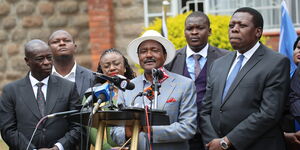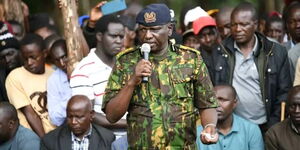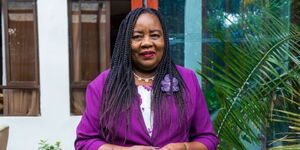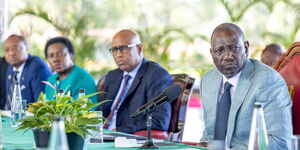A section of leaders from the Mount Kenya region, led by Deputy President Rigathi Gachagua, is fronting the One Man, One Vote, One Shilling formula for sharing the national cake.
The formula proposes population as the main criterion for resource allocation to the counties.
For starters, the formula was among the main proposals of the Building Bridges Initiative (BBI) supported by former President Uhuru Kenyatta and former Prime Minister Raila Odinga.
The drafters of the document observed that revenue cannot be allocated to masses of land but should be given to the people occupying the land instead.
The third basis for sharing revenue takes into account eight parameters: Basic share (20 per cent), Population (18 per cent), Health (17 per cent), Poverty Level (14 per cent), Agriculture (10 per cent), Roads (eight per cent), Land (eight per cent) and Urbanisation (five per cent).
While voicing his support for the proposal in Samburu during a fundraiser for women's groups in the county on June 7, Deputy President Gachagua dismissed his critics against the formula, insisting there was nothing wrong with the calls and was only advocating for equality across the country in terms of revenue allocation.
Githunguri Member of Parliament, Gathoni Wamuchomba, has pushed for the formula fearlessly.
While speaking on Hot 96 Kenya a year ago, Wamuchomba stated that the formula would ensure equity in the sharing of revenue.
"When I say, One Man, One Shilling, and One Vote, I am not speaking about that Kikuyu voter of Githunguri; I am speaking about that person who is in Githunguri, whether born there or otherwise, but produces revenue in Githunguri because we have like 8,000 people who have come to work with Fresha limited."
"Resources should and must be allocated to people and not tracts of land. That's why I support," Gathoni Wamuchomba stated.
It is instructive to note that the vocal MP is the Chairperson of the Constitutional Implementation Oversight Committee in the National Assembly.
A majority of politicians backing the proposal are leaders from the Mount Kenya region. This section of leaders is emboldened by the fact that, based on the 2019 census, 8 of 10 counties in the area, have a population of above 500,000 people.
Legal Perspective
A study by Katiba Institute held that the One Man, One Vote and One Shilling proposal is not supported by the 2010 Constitution and veers away from the spirit of the constitution.
This is based on the fact that the 2010 Constitution has equality for all as one of its key pillars, as enshrined in Article 81 of the governing document.
Governance Expert Philip Mwangale speaking during an interview with Kenyans.co.ke echoed the same, describing the “One Man, One Vote, One Shilling" campaign as a creation of a fertile imagination; a light statement that was stretched too far.
"The Constitution of Kenya outlines the principles of Public Finance in its Article 201. It was our aspiration as Kenyans that the public finance system shall promote an equitable society, and in particular, that the burden of taxation shall be shared fairly and revenue raised nationally shall be shared equitably among national & county governments," Mwangale told Kenyans.co.ke.
He also stressed that the constitution categorically states that public expenditure shall promote the equitable development of the country, including by making special provisions for marginalised groups
The governance expert faulted the calls by the proponents of the One Man, One Vote and One Shilling explaining that Kenyans are pushing for equity and not equality.
"Our rallying call is equity, not equality. While equity is the principle and process, equality is the ultimate result. For an asymmetric population like ours, to begin with equality aiming to achieve equity is to put the cart aside the horse and expect movement," he explained.
He clarified that the criteria to ensure equity per the Constitution are as follows: national interest, public debt and other national obligations, county government functions, the fiscal capacity of county governments, developmental needs, and economic disparities, among other factors.
He dismissed the proponents, stating that they are championing a selfish formula, one that flies in the face of Article 203 of the Constitution.
Article 203 of the Constitution of Kenya guarantees an equitable share of resources.
"If, for example, we entertained that proposition, then the expenditure benefit must follow the taxation burden. The regions (be it constituencies or counties) with the highest populations have also been beneficiaries of huge infrastructure projects."
"These projects were funded by loans. If the benefit must be pegged on who voted more, then the burden of paying back our loans must also be distributed through the one man who voted. It would be pointless for the citizens in Lokitaung to pay the same amount of taxes, which taxes would be used to pay for loans that built a dam in Karimenu, Kiambu County," Mwangale Opined.
According to him, the narrative is largely a Mount Kenya creation and went ahead to dismiss it as a selfish drive.
He stated that before the country moves forward with the One Man, One Vote, One Shilling plan, the benefit must match the burden.












